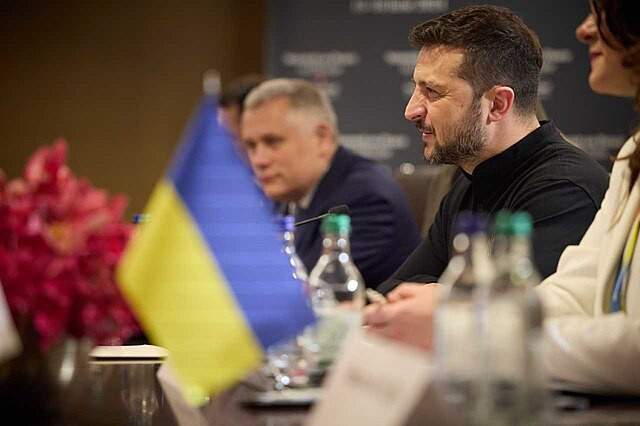European leaders intensified efforts this week to strengthen Ukraine's position ahead of a potential summit between President Donald Trump and Russian President Vladimir Putin, voicing concern that the U.S. president could pressure Kyiv into territorial concessions. The diplomatic scramble came as summit preparations appeared to stall, and Europe's top officials insisted that current battle lines must form the basis of any future peace talks.
Trump has said he hopes to meet Putin in Budapest within two weeks as part of a push to end the war. But a preliminary meeting between U.S. Secretary of State Marco Rubio and Russian Foreign Minister Sergei Lavrov, originally expected to take place Thursday in the Hungarian capital, was postponed. Lavrov's deputy, Sergei Ryabkov, said on Tuesday it was "premature to speak about the timing of any face-to-face meeting."
European leaders - including those of Britain, France, Germany and the European Union - released a joint statement on Tuesday declaring they "strongly support President Trump's position that the fighting should stop immediately, and that the current line of contact should be the starting point of negotiations."
At the same time, leaders at a summit in Brussels worked to finalize a three-part package designed to bolster Ukrainian President Volodymyr Zelenskyy's hand in any talks. The plan includes new weapons shipments, a fresh round of sanctions targeting Moscow's economy, and an ambitious proposal to use the full value of €140 billion in frozen Russian assets to fund Ukraine's war effort.
"Ukraine must be in the strongest possible position - before, during, and after any ceasefire," the leaders said in their joint statement. "We are developing measures to use the full value of Russia's immobilized sovereign assets so that Ukraine has the resources it needs."
Trump's fluctuating position on Ukraine has rattled European capitals. After meeting Zelenskyy at the White House last week, he signaled support for freezing the conflict along existing battle lines - a reversal from statements made just weeks earlier that Kyiv could reclaim all of its territory. European officials fear such a deal could cement Russian control over large parts of the Donbas region and embolden future land grabs.
"You leave it the way it is right now, they can negotiate something later on down the line," Trump said recently, noting that Russia now controls roughly "78 percent" of the Donbas.
The prospect of a Trump-Putin agreement has prompted a wave of behind-the-scenes diplomacy across the continent. EU leaders meeting in Brussels plan to formally request that the European Commission draft legal proposals for a so-called "reparations loan," which would use Russia's frozen assets to fund Ukraine and only be repaid if Moscow agrees to pay damages for the invasion. A German government official said leaders expect to "take a political decision here to use these frozen Russian assets and to mandate the Commission to submit appropriate legislative proposals."
Meanwhile, the EU's top diplomat, Kaja Kallas, confirmed that the bloc is close to approving its 19th sanctions package, targeting foreign banks and cryptocurrencies used by Russia to evade restrictions. "Everybody says territorial integrity is an important value that we stand for," Kallas said. "We have to keep to that, because if we just give away the territories then, this gives a message to everybody that you can just use force against your neighbors and get what you want."






